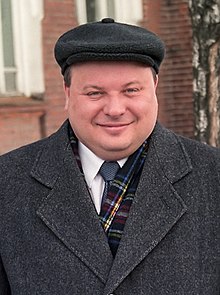You can help expand this article with text translated from the corresponding article in Russian. (September 2012) Click [show] for important translation instructions.
|
Yegor Gaidar | |
|---|---|
Егор Гайдар | |
 Gaidar in 1999 | |
| Prime Minister of Russia Acting | |
| In office 15 June 1992 – 15 December 1992 | |
| President | Boris Yeltsin |
| First Deputy | Vladimir Shumeyko |
| Preceded by | Boris Yeltsin (acting) |
| Succeeded by | Viktor Chernomyrdin |
| First Deputy Prime Minister of Russia | |
| In office 18 September 1993 – 20 January 1994 | |
| Prime Minister | Viktor Chernomyrdin |
| In office 2 March 1992 – 15 December 1992 | |
| President | Boris Yeltsin |
| Minister of Finance | |
| In office 11 November 1991 – 2 April 1992 | |
| President | Boris Yeltsin |
| Preceded by | Igor Lazarev |
| Succeeded by | Vasily Barchuk |
| Personal details | |
| Born | Yegor Timurovich Gaidar 19 March 1956 Moscow, Russian SFSR, Soviet Union |
| Died | 16 December 2009 (aged 53) Odintsovo, Russia |
| Political party | Union of Rightist Forces (2001–2008) |
| Other political affiliations | CPSU (1980–1991) Democratic Choice (1994–2001) |
| Spouse(s) | Irina Smirnova (div.) Maria Strugatskaya |
| Children | 3 sons and daughter, Maria Gaidar[1][2] |
| Education | Moscow State University |
| Signature |  |
Yegor Timurovich Gaidar (/jɪˈɡɔːr ɡaɪˈdɑːr/; Russian: Егор Тимурович Гайдар, IPA: [jɪˈɡor tʲɪˈmurəvʲɪtɕ ɡɐjˈdar]; 19 March 1956 – 16 December 2009) was a Soviet and Russian economist, politician, and author, and was the Acting Prime Minister of Russia from 15 June 1992 to 14 December 1992.
He was the architect of the controversial shock therapy reforms administered in Russia after the dissolution of the Soviet Union, which brought him both praise and harsh criticism. He participated in the preparation of the Belovezh Accords. Many Russians held him responsible for the economic hardships that plagued the country in the 1990s that resulted in mass poverty and hyperinflation among other things, although liberals praised him as a man who did what had to be done to save the country from complete collapse.[1] Jeffrey Sachs, director of Columbia University's Earth Institute, who advised the Russian government in the early 1990s, called Gaidar "the intellectual leader of many of Russia's political and economic reforms" and "one of the few pivotal actors" of the period.[3]
Gaidar died of pulmonary edema, provoked by myocardial ischemia on 16 December 2009.[4]
- ^ a b "Yegor Gaidar". The Daily Telegraph. 16 December 2009. Archived from the original on 13 November 2012. Retrieved 17 December 2009.
- ^ "World Leaders Forum | Yegor Gaidar". Columbia University. April 2007.
- ^ "Yegor Gaidar, Shock Therapy Architect, Dies at 53 (Update2)". Bloomberg News. 30 May 2005. Archived from the original on 29 December 2013. Retrieved 17 December 2009.
- ^ "E.T. Gaidar has passed away". Institute for the Economy in Transition. Archived from the original on 28 December 2009. Retrieved 26 December 2009.